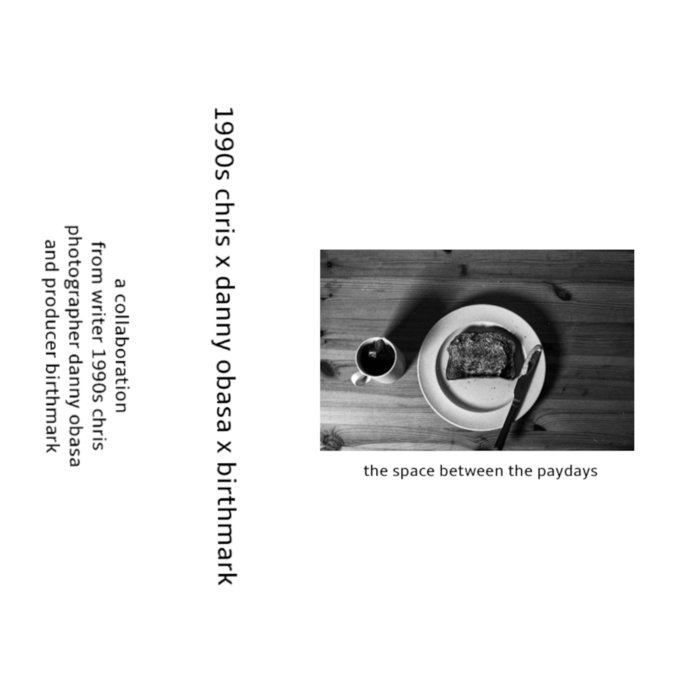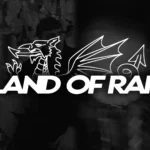Spoken word feels like it’s come a long way in a relatively short time. I remember going to spoken word nights and hearing pseudo-intellectuals reading from their limited run chapbooks, or tablets, to a room full of people with their limited run chapbooks and tablets. They were reading their poems and stories to themselves. People clapped to be polite, and so they got a clap after their turn. Then it all changed. Those writers were replaced by people who didn’t look like them. Who generally had something to say? 1990s Chris feels like one of these people. On his debut release, The Space Between Paydays with producer Birthmark, he gets off his chest many of the things that nark him about modern living. It’s an album filled with pathos and humanity. It’s also incredibly listenable and funny in places too.
The standout track is ‘Your Flat’. Here 1990s Chris paints a slightly bleak picture of inner-city domesticity. It opens with the line: “The view from your old flat was nice. You could see carpets of green. Some would turn gold in the summer”. Then he goes on to talk about having enough of working nights and finishing at 8am. How “A Wetherspoons breakfast and a pint is not really a social life” and not having the energy to argue with the people giving you disapproving looks. There is one line in the song that sums up everything 1990s Chris is trying to get across. “Get a job you don’t hate. Get a missus you don’t hate. Have a kid you don’t resent. Every few months blow it out. Spend the holiday money on pub dust and lie about it in the morning”. It’s like he’s saying that no matter how much you try to better yourself, you can’t. But then later he talks about moving. And you can sense a more tranquil tone in his voice. “Nights out are decent, but the rent is ridiculous.” This is something we have all felt. We are all told, pre pandemic, that you should move to cities as that is where the opportunities are. This is technically true. What you aren’t told is that’s where the vices are too. When I was 26, I moved to London with some friends. It was amazing, but a few weeks after payday my account was running on fumes. I wanted to make the most of my new home, but I couldn’t. In the end you cut corners. Eat a meal deal for lunch so you have some extra money for pints in the evening. Make a sad sandwich for lunch so you can go to see a gig, show or exhibition. Eventually you work out that you aren’t missing out on much and pick and choose when to go out. ’Your Flat’ ends with the line: “The view from your new flat is nice. I’m not sure which is better. It all depends on the light. And the wages”. This is a nice bookend to the opening. It also shows that it doesn’t matter where you live, the problems are always the same.
What really gets the stories of sub living across is the music. For the most part you are concentrating on the words. They are rich and emotive. The deliver pulls you in and everything vanishes. This is because the music is on point. Birthmark has created a slightly ambient soundscape. There are beats but they are there for punctuation, rather than for necessity. On ‘Trolly Operative’ Birthmark follows the cues of the story. Two friends meet and have a rather uncomfortable conversation about work. One has recently lost a job collecting shopping trollies after they were fitting with coin operated locks. The other works in a manufacturing company. As this detail is announced, the music takes on a harder tone. When it is described what is made, Birthmark starts to mimic the sound of machinery. It gets to the point that you can’t really hear what is being said. This mimics working in a factory. Where the noise is almost deafening and having a conversation is hard. It’s a masterstroke and really showcases the brilliance of this pairing.
The Space Between Paydays is a grim dissection of modern living. Throughout, 1990s Chris tells honest stories life on the breadline. ‘Asos’ is about being told you need to consume constantly. Buying for the sake of it and that empty feeling when you click ‘Pay Now’ on websites. And the even emptier feeling you have when realise how crap the things are when they arrive. ‘Trolly Operative’ is about one of those awkward conversations with a friend who is doing slightly worse than you. Then you realise you aren’t doing that well either. ‘Your Flat’ is about moving on because you have to, not because you want to. It’s all there. Plus, more. 1990s Chris speaks these stories with deadpan delivery. It’s hard to get whether he’s annoyed or bored as the delivery is the same throughout. Ultimately it doesn’t matter as the stories are about the continuation of life. So, 1990s Chris just continues to tell his tales. Some make you laugh. Some wince. Others cry, but you always feel something. Always!




